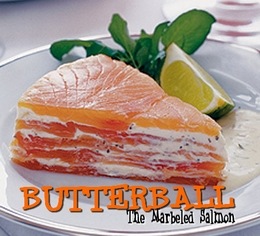 Terms like “girth”, “chunky” and “football”, sprayed at large fish by those lucky enough to have hooked an uncommon specimen. The rest of us nod, recognizing the use of reserved fishing superlatives.
Terms like “girth”, “chunky” and “football”, sprayed at large fish by those lucky enough to have hooked an uncommon specimen. The rest of us nod, recognizing the use of reserved fishing superlatives.
So what are we going to call the exceptional blended farm-raised-wild strain of salmon?
Tom Gill of Dalhousie University told The Chronicle-Herald newspaper in Halifax said producers complaining to him about the texture of their farmed fish can blame themselves for adding fish oil to the salmon feed to increase their weight.
Some ponderous lard body rolls on your fly, giving you a brief and lethargic dead-weight squeal to your drag, then points itself at your feet and gasps in long sobbing wheezes, while drooling all over your shoe.
“So you can fatten the fish up and make them heavy in a hurry by feeding them a high-fat diet, but it gives you a really sloppy sort of soft texture,” he said. “If you’re feeding them a high-fat diet, it’s like feeding an individual on a diet of peanuts and potato chips only — of course they get flabby and soft, and that’s what happens to the fish.”
I’m thinking that this has to turn the angling world upside down. Noble Salmon reduced to crack-whore status, spurned by legions of former aficionado’s, and loved only by the Malibu physician administering celebrity facials.
A “fatbody” isn’t getting up for the morning bite, it’ll be napping by midday, and will skip dusk in favor of the all night drive thru – where it won’t have to display it’s sickly, pale flesh to the gaze of bystanders.
The escape, which was detected four days ago, comes at a time when wild salmon are approaching the rivers to spawn, meaning that there could be intermingling and genetic dilution of the wild fish. These are extremely fit creatures, swimming thousands of miles across oceans, then battling their way upstream.
If they spawn with the flabby, cage-reared fish, it is claimed that the offspring can be genetically weak and the wild salmon population, which is recovering after some very bad years, could be threatened.
The Association of Salmon Fishery Boards and the Rivers and Fisheries Trusts of Scotland are now preparing a formal complaint to the European Commission.
In the states, we’ve always asserted that “wild fish” were superior in every respect to their hatchery counterparts, but will that remain true? Hatchery fish have to make the same journey as a wild fish, imparting some common sense and muscle tone, with the addition of a flabby panting farm fish in the watershed – will we have a new respect for its pen reared migratory cousin?
… and will we invent new terms of endearment and prowess? “Half Pounders” refer to returning small steelhead, will we call the smaller farm fish a “quarter pounder with fleas?”
Will the “honor roll” of distinguished names; King, Chinook, Pink, Dog, Chum, and Silver, be augmented with the Butterball and Acne variants?
“I prefer the Butterball, less stretch marks on the fillet, and the timer pops out when it’s done.”
Go ahead and giggle, a couple seasons from now that could be you talking.
